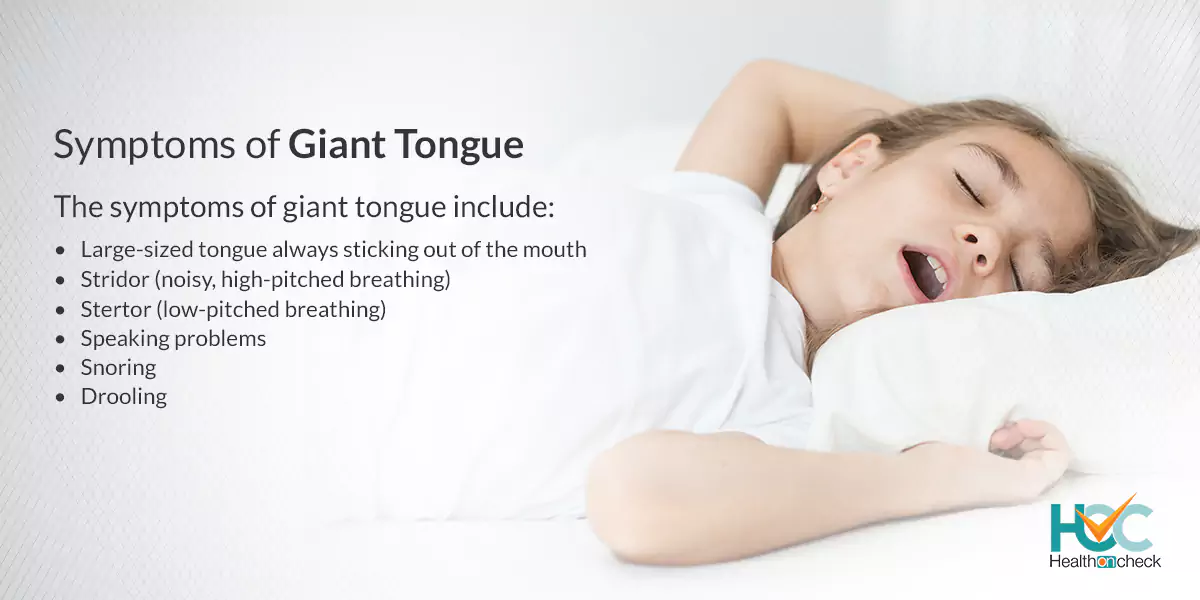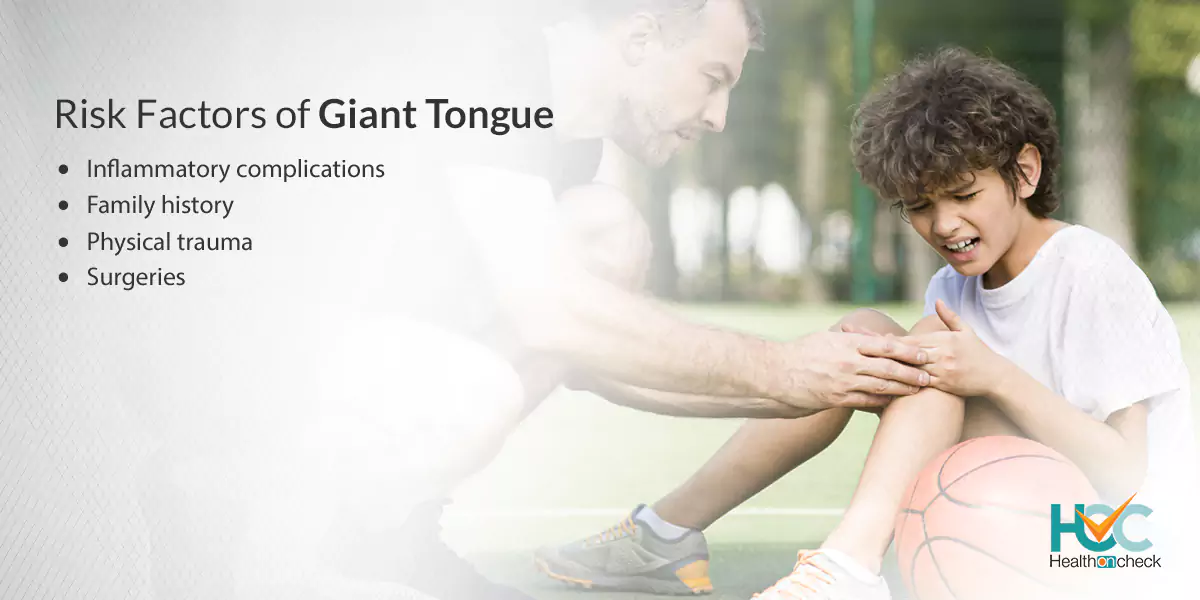All about Giant Tongue

What is Giant Tongue?
Giant tongue also known as macroglossia or large tongue, is a rare disorder that mostly affects children in comparison to adults. As the name suggests, the tongue of the person suffering from it becomes large. People who are born with this condition mostly have some kind of underlying disease such as Beckwith-Wiedemann syndrome or Down syndrome. Since the tongue is a part of our digestive system, the giant tongue can be considered a digestive system disorder. The giant tongue might be present at birth or be acquired later in life. It’s also quite possible to be born with a giant tongue without having any underlying disease. Symptoms and complications linked with giant tongue might include noisy snoring, high-pitched breathing (stridor), or eating difficulties. In a few instances, the tongue might protrude from the mouth.
What are the Types of Giant Tongue?
The giant tongue is classified into two categories:
True macroglossia: In true macroglossia, the tongue becomes large because of tissue overgrowth from tissue infiltration, lingual muscular hypertrophy or glandular hyperplasia, and infectious or inflammatory reasons.
Relative macroglossia: In relative macroglossia, the tongue becomes large compared to other structures in the mouth. Prime examples might include Down syndrome, where the tongue becomes enlarged because of conditions such as hypotonia, and Pierre Robin syndrome due to micrognathia.
What are the Symptoms of Giant Tongue?
The symptoms of giant tongue include:
- Large-sized tongue always sticking out of the mouth
- Stridor (noisy, high-pitched breathing)
- Snoring
- Stertor (low-pitched breathing)
- Speaking problems
- Drooling
What are the Causes of Giant Tongue?
There are several causes of the giant tongue. Most people born with a giant tongue have other conditions and one is rarely born with a giant tongue without any other underlying condition. In some cases, certain medical treatments and surgeries can also cause this disease but mostly it’s inherited and acquired through some illness.
Diseases that can cause giant tongue include:
Beckwith-Wiedemann syndrome: Beckwith-Wiedemann syndrome is a growth disorder syndrome and it causes complications such as big body size and organs and it can also increase risk for children by developing some particular childhood cancers. Around 90% of children with Beckwith-Wiedemann syndrome also have giant tongues.
Hurler/Hunter syndrome (mucopolysaccharidosis): This disease affects your body’s capability to break down sugar molecules.
Down syndrome: People with Down syndrome are born with an extra chromosome, which alters the way their brain and body develop, which might include a giant tongue also.
Acquired conditions that may cause giant tongue include:
Amyloidosis: Amyloidosis is a protein disorder that affects the functions of tissues and organs. The giant tongue is the most common oral symptom of amyloidosis.
Hypothyroidism: Here thyroid is not able to produce and release enough thyroid hormone into your bloodstream which slows down your metabolism and sometimes results in a giant tongue. It’s a common cause of macroglossia among children.
Acromegaly: In acromegaly, your body releases large numbers of growth hormones. People with acromegaly mostly have large and unusual tongues, hands, feet, and hands.
Diphtheria: It causes your tongue to swell. It keeps tissues and organs from working as they should because it’s mainly a protein disorder.
Tumor: Tumors such as lymphangioma, hemangioma, and lymphoma may also cause giant tongue. Giant tongue is one of the main symptoms of these tumors.
What are the Risk Factors of Giant Tongue?
Family history: If you have a family history of the giant tongue then your chances of being born with this increases
Inflammatory complications: Since the tongue is a part of our digestive system, inflammatory conditions such as tuberculosis, glossitis, syphilis sarcoidosis, polymyositis, and certain cancers can cause a giant tongue.
Physical trauma: Any kind of trauma or injury can cause swelling of your tongue and there are chances of you developing a giant tongue.
Surgeries: If you went through any surgery, especially surgery of the cervical spine, craniofacial area, and posterior fossa, then your chances of developing a giant tongue increase.
What are the Complications of Giant Tongue?
The complications of Giant Tongue include:
- Misaligned teeth
- Unusual formation of the jaw
- Problems to learn speaking
- Difficulty breathing
- Obstruction in the airway
- Difficulty eating and chewing
- Temporomandibular joint pain
Increases risk of tongue injury because of exposure
- Dry mouth
- Recurring infections in the upper respiratory tract
How Giant Tongue is Diagnosed?
Giant tongue in infants can be detected if it occurred because of some underlying condition such as Dawn syndrome, Beckwith-Wiedemann syndrome, etc. The doctor will conduct a physical examination where he will examine the tongue, head, and neck of your child or you if you are experiencing the symptoms of the giant tongue.
Some tests are conducted to diagnose gian tongue such as:
Computed tomography (CT) scan: CT scans use a series of X-rays and a computer is used during CT scans to create three-dimensional (3D) images of the patient’s mouth, head, and neck. It helps to diagnose giant tongue.
Magnetic resonance imaging (MRI): This is a painless test where a big magnet, radio waves, and a computer are used to create clear images of organs and structures in the patient’s body to diagnose a giant tongue.
What are the Treatment Options for Giant Tongue?
In a few cases children with Giant “outgrow” the condition when their facial bones grow and their mouths have a place for their tongues.
The treatment starts with diagnosing and treating the underlying condition, then treating the giant leg. The treatment of giant tongue includes:
- Medications are given such as corticosteroids to treat swelling.
- Orthodontic treatment.
- Surgery. Nearly 10% of people with giant legs have to go for surgery to decrease the size of their tongues.
Living with Giant Tongue
Giant tongue mostly occurs due to some underlying condition, so at first your doctor will diagnose the underlying condition and treat them. Diagnosis and treatment for the underlying condition are the first steps to ease the symptoms. Apart from this, if your child is born with a giant tongue then it may be overwhelming and shocking for you but you need to control your emotions and take utmost priority to manage and treat the condition.
Whom to Consult?
If you notice symptoms of giant tongue in your newborn, then tell your doctor about it who will do a physical examination and if giant tongue is diagnosed, then the treatment will start accordingly. If it’s because of any underlying condition then the doctor will first manage its symptoms. If it’s acquired then the doctor will find out the cause behind it. In some cases, surgery may be done, if it’s acquired.






